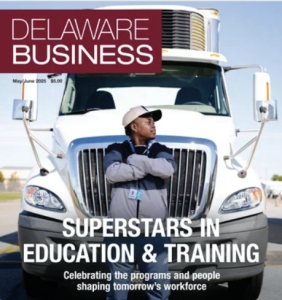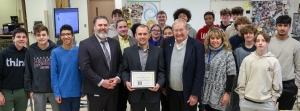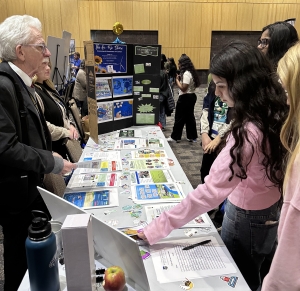Nonprofit Spotlight: Delaware Foundation for Science and Mathematics Education (DFSME)
By Colin Heffinger | Originally published in Delaware Business Magazine, May / June 2025
 It all starts with a single spark. From that moment a thought erupts, expanding and dispersing like wildfire, until it forges creativity, passion, and a growing hunger for knowledge. Whether working in health research, protecting the environment, or exploring how the universe works, anyone who has shaped a career in math and science speaks fondly of the moment that brought their career vision to life. For the Delaware Foundation for Science and Mathematics Education (DFSME), nurturing that first spark for upcoming generations is key to ensuring the STEM pipeline can meet the evolving needs of the First State.
It all starts with a single spark. From that moment a thought erupts, expanding and dispersing like wildfire, until it forges creativity, passion, and a growing hunger for knowledge. Whether working in health research, protecting the environment, or exploring how the universe works, anyone who has shaped a career in math and science speaks fondly of the moment that brought their career vision to life. For the Delaware Foundation for Science and Mathematics Education (DFSME), nurturing that first spark for upcoming generations is key to ensuring the STEM pipeline can meet the evolving needs of the First State.
Now celebrating its 30th anniversary, DFSME found its own spark when leaders from Delaware’s business, education, and legislative communities united with a commitment to a high-standard education process within public school systems. DFSME emerged from this initiative to guide impactful reform in science and math education for students from preschool through higher education.
“We identify, advocate for, and tackle gaps within the education system,” said Randolph Guschl, executive director of DFSME. “By doing this, we envision our STEM education system as a powerful tool to attract businesses, families, and innovative educators to Delaware.”
“Our largest focus is on STEM educators—continuing to recruit and retain teachers,” added Michelle Kutch, vice president of the DFSME board. “We do this through professional development, awards, grants, events, and other meaningful resources. How a teacher feels in the classroom is our top recruitment strategy.”
Supporting STEM educators goes beyond the traditional classroom. DFSME’s awards and grants recognize after-school teachers and other educators within communities. Their events take it a step further by bringing together business leaders and students to create new connections and reinforce the value educators provide in strengthening the STEM pipeline. Even so, DFSME faces a growing challenge: declining science instruction time in public schools.
“Due to the pandemic and shifts in society, the amount of time students spend on science has fallen dramatically,” said Anne Pfaelzer de Ortiz, director of development and operations.

DFSME leaders awarding the 2024 Shining Light Award to Jordan Estock at Concord High School.
“Schools are measured for success by certain factors, and those typically focus on reading and math rates. To make matters worse, students have fewer opportunities to see if a field in science is a good fit. Despite this, science skills are essential in daily life, and it’s critical that children develop them at an early age—especially in today’s technology-driven world.”
“Providing opportunities for that spark in science to be nurtured through innovative teachers and engaging curricula is key,” stated Guschl. “This is why we encourage, for example, finance companies to realize their connection to STEM. Each of these businesses can make a difference by supporting DFSME or volunteering to teach current students.”

Photo Inset: DFSME team members at the Delaware Youth Environmental Summit
Considering Delaware’s business needs for a strong STEM pipeline, Pfaelzer de Ortiz pointed back to the nonprofit’s roots in passion and collaboration. “As a team, we believe in what we do, and we’re passionate that it’s the most important thing we can do,” she reflected. “Looking forward, nonprofits can do more by creating partnerships and sharing resources for a common cause. This is how we will all truly grow and make the most meaningful impact throughout Delaware.”
By Colin Heffinger | Originally published in Delaware Business Magazine, May / June 2025
 It all starts with a single spark. From that moment a thought erupts, expanding and dispersing like wildfire, until it forges creativity, passion, and a growing hunger for knowledge. Whether working in health research, protecting the environment, or exploring how the universe works, anyone who has shaped a career in math and science speaks fondly of the moment that brought their career vision to life. For the Delaware Foundation for Science and Mathematics Education (DFSME), nurturing that first spark for upcoming generations is key to ensuring the STEM pipeline can meet the evolving needs of the First State.
It all starts with a single spark. From that moment a thought erupts, expanding and dispersing like wildfire, until it forges creativity, passion, and a growing hunger for knowledge. Whether working in health research, protecting the environment, or exploring how the universe works, anyone who has shaped a career in math and science speaks fondly of the moment that brought their career vision to life. For the Delaware Foundation for Science and Mathematics Education (DFSME), nurturing that first spark for upcoming generations is key to ensuring the STEM pipeline can meet the evolving needs of the First State.
Now celebrating its 30th anniversary, DFSME found its own spark when leaders from Delaware’s business, education, and legislative communities united with a commitment to a high-standard education process within public school systems. DFSME emerged from this initiative to guide impactful reform in science and math education for students from preschool through higher education.
“We identify, advocate for, and tackle gaps within the education system,” said Randolph Guschl, executive director of DFSME. “By doing this, we envision our STEM education system as a powerful tool to attract businesses, families, and innovative educators to Delaware.”
“Our largest focus is on STEM educators—continuing to recruit and retain teachers,” added Michelle Kutch, vice president of the DFSME board. “We do this through professional development, awards, grants, events, and other meaningful resources. How a teacher feels in the classroom is our top recruitment strategy.”
Supporting STEM educators goes beyond the traditional classroom. DFSME’s awards and grants recognize after-school teachers and other educators within communities. Their events take it a step further by bringing together business leaders and students to create new connections and reinforce the value educators provide in strengthening the STEM pipeline. Even so, DFSME faces a growing challenge: declining science instruction time in public schools.
“Due to the pandemic and shifts in society, the amount of time students spend on science has fallen dramatically,” said Anne Pfaelzer de Ortiz, director of development and operations.

DFSME leaders awarding the 2024 Shining Light Award to Jordan Estock at Concord High School.
“Schools are measured for success by certain factors, and those typically focus on reading and math rates. To make matters worse, students have fewer opportunities to see if a field in science is a good fit. Despite this, science skills are essential in daily life, and it’s critical that children develop them at an early age—especially in today’s technology-driven world.”
“Providing opportunities for that spark in science to be nurtured through innovative teachers and engaging curricula is key,” stated Guschl. “This is why we encourage, for example, finance companies to realize their connection to STEM. Each of these businesses can make a difference by supporting DFSME or volunteering to teach current students.”

Photo Inset: DFSME team members at the Delaware Youth Environmental Summit
Considering Delaware’s business needs for a strong STEM pipeline, Pfaelzer de Ortiz pointed back to the nonprofit’s roots in passion and collaboration. “As a team, we believe in what we do, and we’re passionate that it’s the most important thing we can do,” she reflected. “Looking forward, nonprofits can do more by creating partnerships and sharing resources for a common cause. This is how we will all truly grow and make the most meaningful impact throughout Delaware.”
